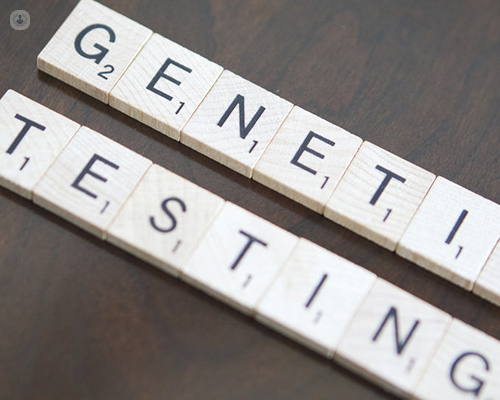

What is genetic testing?
Genetic testing is a tool that is used to find out whether a person is carrying a specific altered (mutated) gene that causes a particular medical condition such as a disease.

What are the different types of genetic testing?
The different types of genetic testing and their purpose include:
- Diagnostic genetic testing – to diagnose a person with a genetic condition. It can determine cystic fibrosis or Huntington’s disease.
- Predictive genetic testing – to work out the chances of a person developing a genetic disease before they have symptoms. This is usually when the medical condition runs in the family. This can be useful for determining a risk of certain types of colorectal cancer.
- Preimplantation testing – this is used when attempting to conceive a child through in vitro fertilisation, as the embryos are screened for genetic abnormalities. The embryos without abnormalities are implanted into the uterus.
- Prenatal testing – to find a genetic disease in an unborn baby’s genes. Down syndrome and Trisomy 18 syndrome are two disorders that are screened for during prenatal genetic testing. This is done by looking at markers in blood. Newer testing called cell-free DNA testing can sample the baby’s DNA using a blood test on the mother.
- Newborn screening – this is offered for babies in their first six to eight weeks. For babies with health problems the benefits are enormous as newborns are tested for certain genetic and metabolic abnormalities that can cause certain conditions.
- Carrier testing – the patient is advised to have this test before having children if they have a family history of a genetic disorder, such as a sickle cell anaemia or cystic fibrosis. Some ethnic groups have a higher risk of some genetic disorders.
- Pharmacogenetics – this may help determine what medication and dosage would be most effective if someone has a health condition or disease.
How are genetic tests made?
There are different way to test, which collects samples that will be sent to a lab for analysis. These include:
- Blood sample
- Cheek swab
- Amniocentesis – used for prenatal genetic testing, a thin needle is inserted through the abdominal wall into the uterus to sample the amniotic fluid.
- Chorionic villus sampling – also used for prenatal testing, the doctor takes a sample from the placenta.
What is genetic counselling?
Genetic counselling provides support, information and advice to those who have been referred to a genetic counsellor by their doctor. A healthcare professional will discuss the health condition that runs in the family and how it may be affecting the patient and their family. The counsellor will discuss the risk of a couple passing on an inherited condition to their child and offer support if the patient wants to have another child. The counsellor can also discuss the different types of genetic testing, including the risks and benefits of each.
